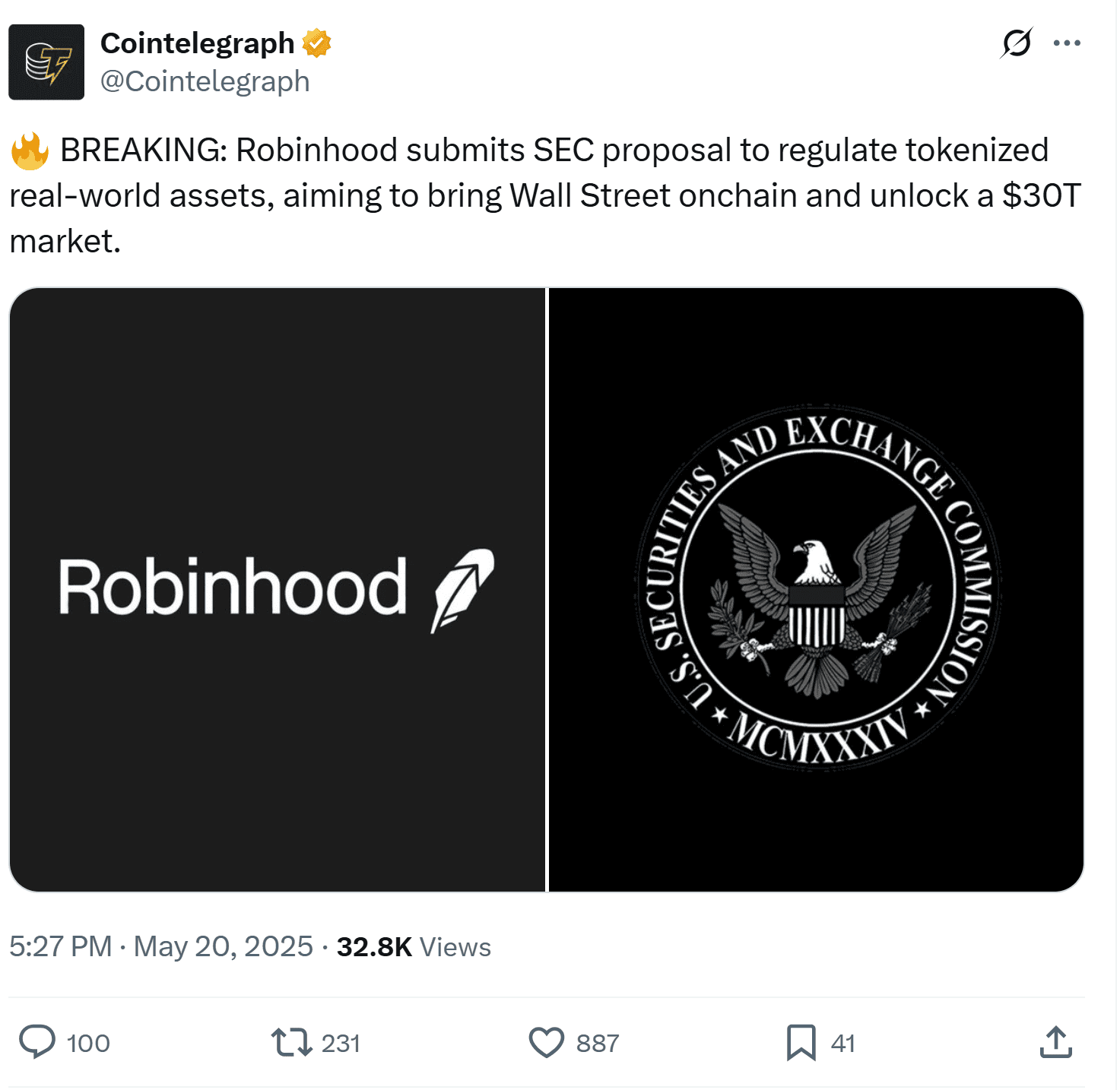Robinhood has taken a significant step towards bridging traditional finance and the world of blockchain by submitting a detailed proposal to the U.S. Securities and Exchange Commission (SEC) outlining a framework for regulating tokenized real-world assets (RWAs). This 42-page document calls for the establishment of national standards to govern these digital representations of tangible assets, aiming to modernize financial infrastructure and unlock new opportunities for investors and institutions.
At the heart of Robinhood’s proposal is the concept of token-asset equivalence. The company argues that a token representing an underlying asset, such as a U.S. Treasury bond, should be legally treated as the bond itself, rather than as a derivative or synthetic product. This would allow for the seamless integration of tokenized RWAs into the existing regulatory landscape, streamlining custody, trading, and settlement processes.
Key Highlights of Robinhood’s RWA Proposal:
- National Framework: Calls for a unified federal approach to RWA regulation, replacing the current patchwork of state-level rules.
- Token-Asset Equivalence: Advocates for treating tokenized assets the same as their traditional counterparts.
- Real World Asset Exchange (RRE): Plans to launch a new trading platform for RWAs with offchain trade matching and onchain settlement.
- Enhanced Efficiency: Aims to reduce settlement times from T+2 to T+0, potentially cutting trading costs by 30%.
- Compliance Integration: Emphasizes the use of KYC and AML tools via partnerships with Jumio and Chainalysis.
Introducing the Real World Asset Exchange (RRE)
A central component of Robinhood’s vision is the creation of the Real World Asset Exchange (RRE), a dedicated platform for trading tokenized RWAs. This exchange is designed to offer a blend of speed, efficiency, and transparency by combining offchain trade matching with onchain settlement. The RRE will operate on a dual-chain architecture, leveraging the capabilities of both Solana and Base blockchains.
Robinhood projects impressive performance metrics for the RRE, including:
- Sub-10 Microsecond Matching Latency: Ensuring rapid trade execution.
- Throughput of Up to 30,000 Transactions Per Second: Handling high volumes of trading activity.
These advancements could significantly compress settlement times in U.S. capital markets, moving from the current T+2 standard to T+0 (same-day settlement). This reduction in settlement time has the potential to lower trading costs by an estimated 30% annually, benefiting both institutions and individual investors.

The Growing Momentum of RWA Tokenization
Robinhood’s proposal arrives amidst a surge of interest and activity in the RWA tokenization space. Major players from both traditional finance and the crypto industry are exploring the potential of tokenizing various assets.
Recent examples include:
- BlackRock: Filed to create a blockchain-based share class for its $150 billion Treasury Trust Fund, allowing for digital representation of investor ownership.
- Libre: Revealed plans to tokenize $500 million in Telegram debt via its new Telegram Bond Fund.
- MultiBank Group: Inked a $3 billion tokenization deal with UAE real estate firm MAG and blockchain provider Mavryk.
Experts believe that this increased activity is driven by a confluence of factors, including:
- Clarifying Regulations: Major markets are developing clearer regulatory frameworks for digital assets.
- Technological Advancements: Blockchain technology has matured and is now more scalable and efficient.
- Institutional Adoption: Large financial institutions are actively exploring and implementing tokenization strategies.
The Potential Benefits of RWA Tokenization
RWA tokenization offers a range of potential benefits, including:
- Increased Liquidity: Tokenization can make previously illiquid assets more easily tradable.
- Fractional Ownership: Allows investors to own smaller portions of high-value assets.
- Improved Transparency: Blockchain technology provides a transparent and auditable record of ownership and transactions.
- Reduced Costs: Streamlined processes can lower transaction and administrative costs.
- Greater Accessibility: Opens up investment opportunities to a wider range of investors.
Challenges and Considerations
While RWA tokenization holds immense promise, it also presents certain challenges and considerations:
- Regulatory Uncertainty: The legal and regulatory landscape for digital assets is still evolving.
- Security Risks: Blockchain-based systems are vulnerable to cyberattacks and security breaches.
- Interoperability: Different blockchain platforms may not be easily interoperable, creating challenges for cross-chain transactions.
- Custody Solutions: Secure and reliable custody solutions are needed to protect tokenized assets.
Conclusion
Robinhood’s proposal to the SEC represents a significant step forward in the development of a regulatory framework for tokenized real-world assets. By advocating for token-asset equivalence and establishing a dedicated RWA trading platform, Robinhood is positioning itself as a leader in the emerging world of digital finance. As the regulatory landscape continues to evolve and technological advancements drive further innovation, RWA tokenization has the potential to transform traditional financial markets and unlock new opportunities for investors and institutions alike.